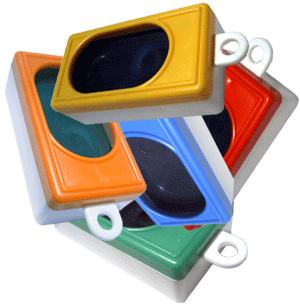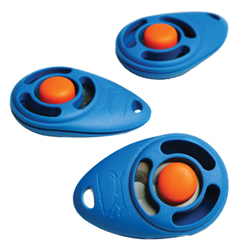House soiling is one of the major reasons pets are relegated to the back yard or given up for adoption. In young cats, it is often a matter of teaching the animal where it is appropriate to eliminate. In intact adult or adolescent animals, marking behaviors are often the problem. In spayed and neutered pets, illness or stress can cause a change in elimination patterns. Below we have listed possible causes and solutions for various house soiling problems.
Cat is eliminating outside the box

- House training your kitten is usually pretty easy. Make sure the litter box is in a quiet place where the kitten won't be disturbed. Do not place it near his food and water bowls. Cats don't like to eat where they eliminate. Make sure the kitten knows where the litter box is and keep it clean.
- Confine young kittens to one room or a large crate when unsupervised (when you are sleeping or out of the house). When you cannot watch him closely, put him in his kennel so that he will not have an opportunity to make a mistake. Make the kennel or small room enjoyable with bedding, chew toys, scratching post, water and food bowl and litter box.
- If the kitten is not using the litter box, review the following:
Ø Are there enough boxes for every cat in the house? Experts actually recommend one box per cat plus one. This is not always feasible, but at least one box per cat is advised.
Ø Is the box in a quiet location where the kitten isn't likely to be disturbed, frightened or harassed by other pets?
Ø Are you cleaning the box regularly?
Ø If your kitten is eliminating outside the box, but still near it, there may be a health issue. Take your kitten to your vet right away.
- Sometimes cats with urinary infections will stop using the litter box because they are now associating the pain of the infection with the box. Once the infection is treated, moving the box, changing the brand of litter, and replacing the box may help your cat return to using the litter box.
- If you are having problems with litter box training, the first step is to rule out any illness. Please contact us for an appointment.
- Another possible problem is marking behavior. Intact cats, especially males, but sometimes females, will spray urine to mark territory. Often spaying and neutering these animals will decrease or eliminate the problem. However, the longer they practice the behavior, the more likely they are to continue it. It's best to spay and neuter early, before marking behavior begins.
- Sometimes cats will eliminate outside the box due to behavior problems related to stress. Cats can even develop urinary tract infections due to stress. Identifying and removing the cause of the stress is the first line of defense. Then we can treat any infection and hopefully eliminate the problem. If this doesn't work, your veterinarian may recommend additional medication to help relieve your cat's stress.

If your cat is eliminating outside the
box
In adult cats that are already litter box trained,
elimination outside the box usually indicates an illness. Cats will urinate
beside the box, on a nearby rug, in the middle of the bed, on a couch cushion,
on a pile of dirty laundry and any number of other places when they have a
urinary tract illness. We've even had clients tell us the cat urinated in the
bathroom sink or on top of the stove! We don't really know why they urinate in
such strange places; possibly it's a message to us that they don't feel well.
Sometimes the cat has started to associate the litter box with the pain of an
infection. Check the color of the urine, does it look normal? Are you seeing
blood in the urine? If so, make an appointment right away.
Check out this document for additional information. If you need to bring your cat to the vet, bring the form with you.
If everything else about the litter box has remained the same, then urination outside the litter box is not normal. Cats can be finicky, have you changed anything about the litter box or its environment? In other words:
Ø Are there enough boxes for every cat in the house. Got a new cat? Add another box. The rule of thumb is 1 box per cat plus 1... usually you can get away with 1 per cat.
Ø Is the box in a quiet location where the cat isn't likely to be disturbed, frightened or harassed by other pets? If you got a new cat/kitten, you may need to separate the litter boxes to give them a little peace.
Ø Are you cleaning the box regularly? This doesn't just mean 'scooping.' If you use clumping litter, the entire box needs to be changed regularly, not just the dirty spots. The litter bags tell you to use 3 inches of litter. I find that it's better to use less and dump it more frequently. However, some cats like deep litter to dig in. Each cat's preference is different and some are much pickier than others.
Ø Have you changed brands of litter, litter box liners, replaced the box with a different style, changed the location of the box or put something new near it? Some cats are finicky, not just in eating habits, but in elimination habits. Try putting things back the way they were, then if you must change things, try to make small changes. For example: Mix the old and new litter for a few weeks, then gradually use less of the old. Make sure the new box is the same size as the old one, etc.
Ø The same applies for bowel movements made outside the litter box. But you also need to check that they are well-formed, not runny, or too hard. Sometimes long-haired cats will get fecal balls stuck on their coat. Check to see if a little trimming isn't needed.
If your cat is eliminating outside the box, there may be a health issue. Don't wait weeks, if cleaning the box doesn't work, call and make an appointment right away. Sometimes cats with urinary infections will stop using the litter box because they are now associating the pain of the infection with the box. Once the infection is treated, moving the box, changing the brand of litter, or replacing the box may help your cat return to using the litter box more quickly.
If you are having problems with inappropriate eliminations, the first step is to rule out any illness. Please contact you veterinarian for an appointment right away.
















